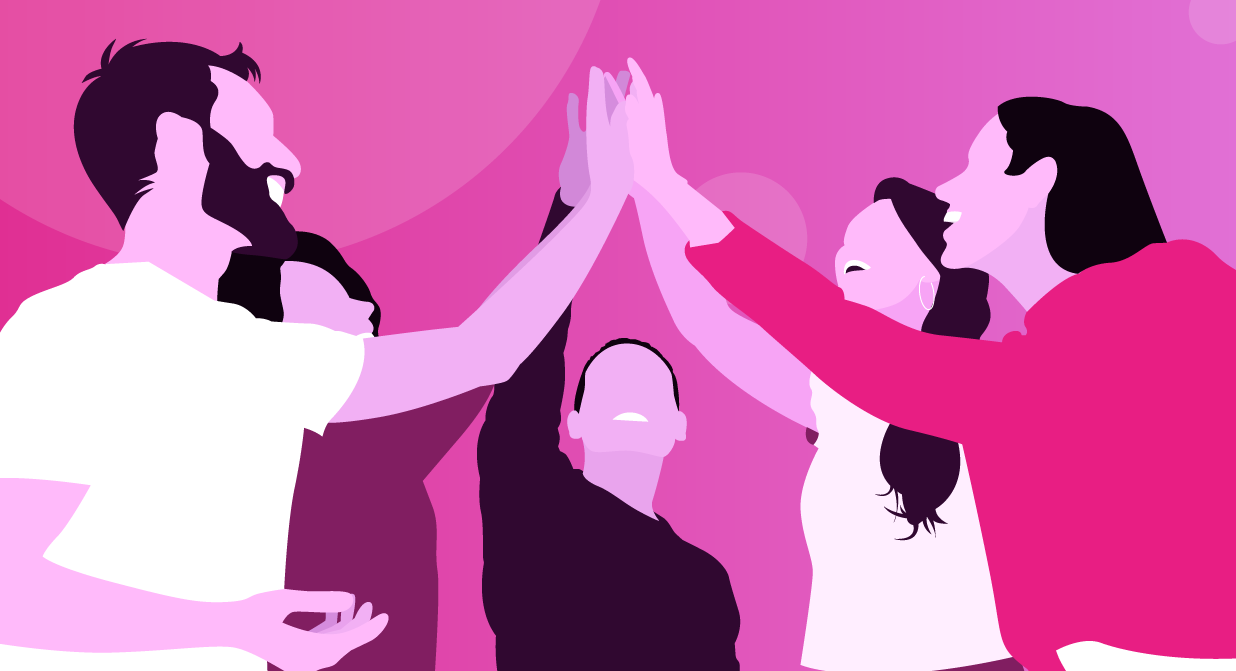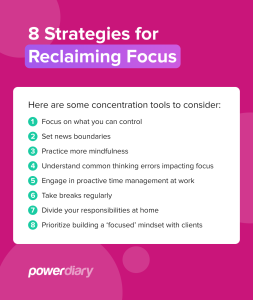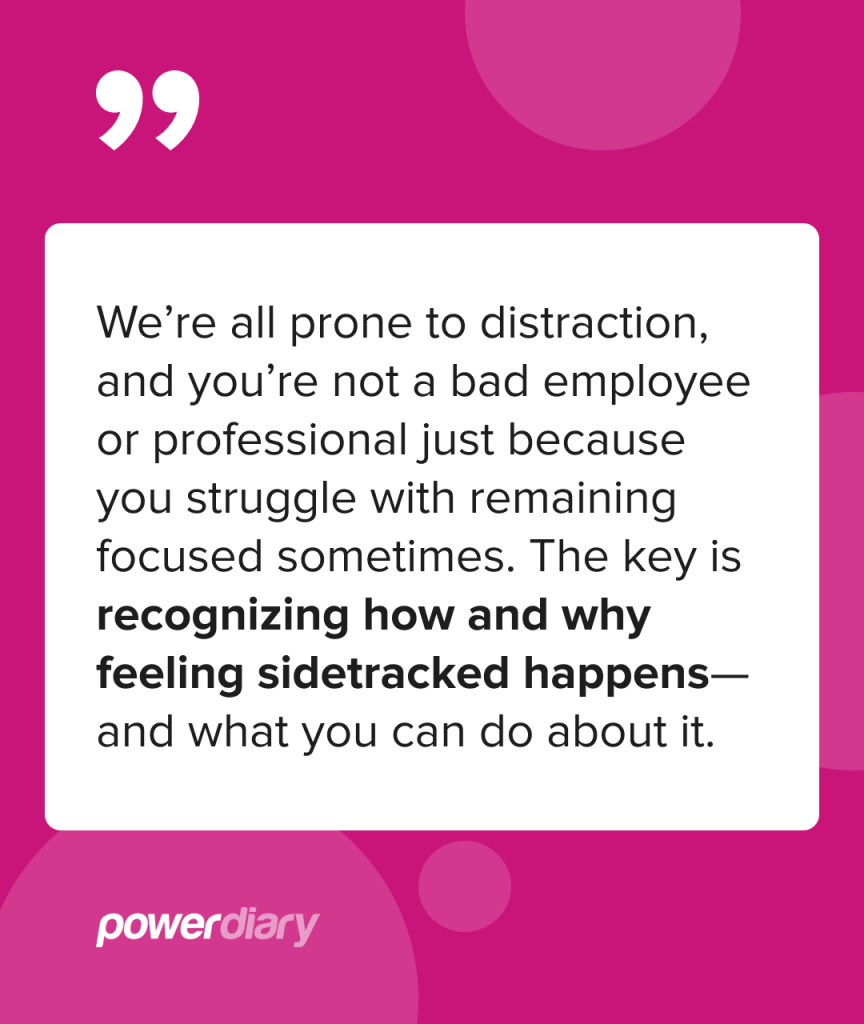This article is written by Nicole Arzt, LMFT
Today’s fast-paced world bombards us with constant messages urging us to optimize every aspect of life. Maximum productivity seems to be the virtuous goal. But despite the desire for efficiency, we’re inundated with endless distractions competing for our focus.
It’s no wonder our attention spans seem to be shrinking!
As a healthcare professional, staying present in your work is essential. You need to give your clients the attention they deserve. In this article, we’ll review how to stay focused, even when you feel tired, restless, or prone to distraction.
The Impact of Information Overload
Research shows that media overload adversely affects our mental health. 24/7 access to streaming news and curated social media algorithms can perpetuate anxiety and dread. For example, doomscrolling offers an illusion of control, but it may also coincide with intense helplessness.
Of course, this is a recent phenomenon. Before the Internet, people were limited to receiving their news via slower-paced mediums – newspapers, radio, television, or word-of-mouth conversations. Today, however, it can seem like global news occurring far away is right in front of you. Similarly, media outlets often rely on sensationalism (sometimes known as clickbait) over substance to pique interest and drive engagement.
The truth is that information overload affects everyone. Even if you deliberately avoid the news, you can’t necessarily prevent people in your life from talking about current events.
The Healthcare Professional’s Unique Challenges
At any given time, you may be aware of your needs, your clients’ needs, your organization’s needs, and larger macro-level societal needs. This can become draining and confusing, even if you’ve been working long enough to maintain professional distance.
Burnout can emerge from navigating these ongoing external demands. You may constantly feel like you’re not doing enough. Or, you might be doing so much that you feel completely apathetic or drained. Both mindsets feel emotionally heavy.
The end of the year can also bring inherent stressors. Research shows that 89% of adults indicate feeling stressed during the holiday season – almost half of those individuals experience more stress during the holidays than at other times. While there is no perfect work-life balance, the challenges associated with “getting it all done” may feel pronounced.
8 Strategies for Reclaiming Focus
Reclaiming focus requires effort and dedication. It isn’t just about forcing yourself to pay more attention. It’s more about knowing what pulls your attention and how you can deliberately take yourself back into the present moment.
Here are some concentration tools to consider:
Focus on What You Can Control
Remember that you’re not in charge of controlling, fixing, or changing the entire world. Identify the variables within your influence, including your immediate actions. If you start feeling anxious, take a deep breath and ask yourself, What am I trying to control right now? If it’s external to you, gently ask, How can I practice letting go?
Set News Boundaries
Consider limiting your news consumption and implementing dedicated time to interact with the news, such as once in the morning and once at night. Aim to choose a few trusted sources and eliminate looking for news elsewhere. This can offset information overload. Identify a few alternative coping skills you can use to replace doomscrolling habits.
Practice More Mindfulness
Set aside a few minutes each day to engage in mindful breathing or a guided meditation. When your mind inevitably wanders, simply bring your focus back to your breath without judgment. Throughout the day, try to engage in your basic tasks (brushing your teeth, eating, walking to your office) more consciously. This can help improve your overall sense of attentiveness.
Understand Common Thinking Errors Impacting Focus
Certain thinking errors like all-or-nothing (I must do it perfectly, or it’s a total disaster) or jumping to conclusions (this is going to be so hard. It’s going to take so much time!) can affect your focus more than you realize. Recognizing and reframing these thinking errors may improve your productivity and feelings of competence.
Engage in Proactive Time Management at Work
Consider starting each day prioritizing your tasks based on their level of urgency and significance. This can help you stay focused and ensure that you don’t miss important deadlines. Set structured ‘focus’ times where you’re solely dedicated to work. To make the most of these chunks of time, aim to eliminate or reduce external distractions. Turn your phone onto ‘do not disturb’ or put it away altogether.
Take Breaks Regularly
If possible, plan to take regular breaks to keep yourself energized and attentive. To make the most of your breaks, give yourself some physical space from your immediate work area. Take a brisk walk outside or spend some time with a coworker in their office. Drink water and make sure to eat a healthy snack. These tasks may seem small, but they add up to recharge you both physically and mentally.
Divide Your Responsibilities at Home
List all the daily, weekly, and sporadic tasks that your household needs to run effectively. Then, get together with all household members and start delegating tasks based on preference, availability, and competence. Remember that you may need to relinquish some control, but doing so can free up your time and help you feel less overwhelmed.
Prioritize Building a ‘Focused’ Mindset With Clients
Before each appointment, review the last session’s notes and consider if you need to address any key points. Create a working (but flexible) agenda. While in session together, prioritize your active listening skills. Aim to be fully present and collaborative. If you find yourself getting distracted, internally pause and make a brief mental note of what’s happening inside you. Then, without internal judgment, gently redirect your attention back to your client.
Conclusion
We’re all prone to distraction, and you’re not a bad employee or professional just because you struggle with remaining focused sometimes. The key is recognizing how and why feeling sidetracked happens- and what you can do about it.
Like anything, implementing these focus tools takes practice. But the more you implement them, the more intuitive they’ll start to feel. Remember that self-compassion also matters – you’re only human, and it’s important to be kind to yourself if you’re feeling overwhelmed or inattentive. Consider what might be going on professionally or personally and try to tend to those needs as best you can.
Nicole Arzt is a licensed marriage and family therapist and author working in private practice in Orange County, CA. Nicole has worked in various settings throughout her career, including hospitals, schools, nonprofit community health clinics, and private practice.







